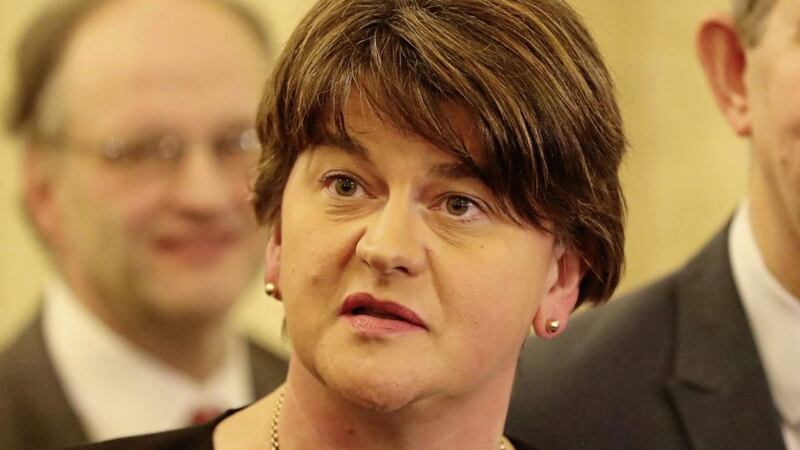DUP leader Arlene Foster has hit out at attempts to use the threat of the return of violence in the north as a "bargaining chip" in the Brexit negotiations.
Speaking at the British Chambers of Commerce (BCC) annual conference in London, Mrs Foster said warnings the peace process could be under threat were an "insult" to the people of Northern Ireland.
Her comments are likely to be seen as a rebuke to former British prime ministers Tony Blair and Sir John Major who have voiced concerns about the consequences of a return of border controls between the north and the Republic.
The EU's chief negotiator, Michel Barnier, has also repeatedly stressed the need to protect the Good Friday agreement in any Brexit deal.
Mrs Foster, whose party props up Theresa May's government in the House of Commons, insisted she did not want to see the imposition of a "hard border" after Britain leaves the EU.
At the same time she reaffirmed her party's objection to the EU's "fallback" plan which would effectively keep Northern Ireland in the single market if the two sides were unable to resolve the border issue.
"I want to see an optimistic, sensible and pragmatic approach to Brexit," she said.
"I object in the strongest possible terms to people who have limited experience of the Troubles in Northern Ireland throwing threats of violence around as some kind of bargaining chip in this negotiating process.
"To do so is an insult to the people of Northern Ireland who worked so hard to bring peace to our country."
Earlier, International Trade Secretary Liam Fox criticised those in the EU who sought to "punish" Britain for voting to leave, and called for "decorum and patience" in the negotiations.
"Punishing Britain to me is not the language of the club, it is the language of the gang," he told the conference.
"I do believe rationality and common sense will win the day if we conduct ourselves with decorum and patience. It is in all our interests to keep the temperature down."
In his opening address, BCC president Francis Martin warned businesses would start looking overseas to grow if there was no agreement on a transition deal at the next EU summit towards the end of March.
"Over the next fortnight, the government must deliver a swift agreement on transition that gives business short-term certainty - and they must strain every sinew to deliver a pragmatic long-term settlement that keeps trade and commerce
flowing," he said.
"The time for political posturing on both sides is over. The time for getting stuck into the detail and answering those real world business questions has arrived, otherwise there's the very real possibility that we will see business hiring less, investing less, or, worst of all, looking elsewhere for future growth."
Meanwhile, shadow chancellor John McDonnell accused the Government of seeking a deal for Britain's financial services sector at the expense of the rest of the economy.
He said that while a Labour government would seek to ensure continued market access, there would be no "special privileges" for the City under a Labour government.
"We want a financial system that works for the people and the wider economy, not only as has so often been the case in the past for the benefit of a small elite at the top of that industry," he said.
"It means we need a government that pays a little less time and attention to the rentiers and speculators. It means making finance the servant not the master of the real economy."








